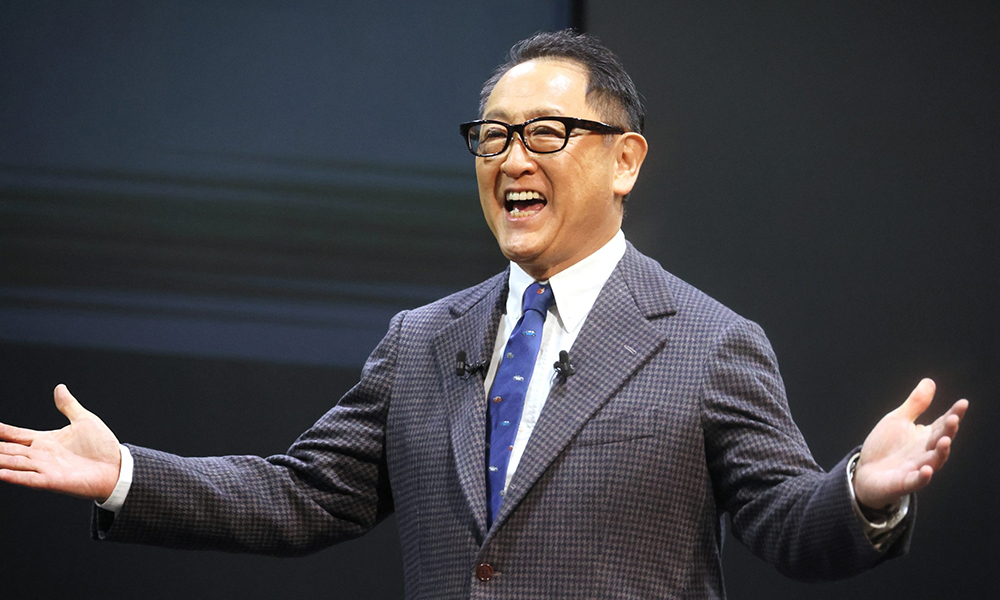
股东们对日本企业巨头之一的进展表示不满。
丰田汽车(Toyota Motor Corp.)现任董事长丰田章男曾担任总裁兼首席执行官近14年,直到今年早些时候才卸任。在丰田章男的领导下,丰田在2020年首次成为全球最大的汽车制造商。
但在日本时间周三上午召开股东大会时,一些丰田的股东,如纽约州审计长办公室(管理该市养老基金)和加州公务员退休基金(Calpers),将提议罢免丰田章男(丰田汽车创始人的孙子)。
原因是:丰田章男——以及丰田公司——在电动汽车方面进展缓慢。虽然该公司在销售混合动力汽车方面仍处于领先地位,但在制造纯电动汽车方面如今只是在尽力追赶福特(Ford)和通用汽车(General Motors)等老牌公司,以及特斯拉(Tesla)或中国比亚迪(BYD)等新来者。
纽约市审计长布拉德·兰德(Brad Lander)对《华尔街日报》表示:“丰田未能像其同行一样,及时转向,拥抱电动汽车”。
这两家养老基金还认为,该公司董事会缺少独立董事,它们都投票支持一项单独的决议,要求该公司更多地披露在气候变化问题上的游说活动信息。
虽然这一提案不大可能通过,但《华尔街日报》指出,在日本企业文化中,即使只有部分股东持反对意见,也很罕见。去年丰田章男被重新提名为董事会成员,赢得了96%的支持率。
“即使在如此艰难的商业环境中,董事长丰田章男也一直在从长远的角度出发来增强我们的竞争力。”公司发言人告诉《华尔街日报》。
丰田和电动汽车
与福特的吉姆•法利(Jim Farley)、通用汽车的玛丽•巴拉(Mary Barra)、特斯拉的埃隆•马斯克(Elon Musk)等高管不同,丰田章男在担任首席执行官的最后几个月里,对电动汽车公开持怀疑态度。
去年12月,丰田章男抱怨说,公众压力正阻止高管们——他称之为“沉默的大多数”——诚实谈论电动汽车,他们只能声称电动汽车是“唯一的选择”。
他暗示:“他们认为这是趋势,所以不敢大声表述自己的观点。”
今年1月,丰田汽车宣布,丰田章男将辞去总裁职务,由时任丰田汽车旗下豪华品牌雷克萨斯(Lexus)负责人佐藤恒治(Koji Sato)接任。“在数字化、电动汽车和联网汽车方面,我没有跟上潮流。”丰田章男当时表示。
佐藤恒治于今年4月接任总裁,并宣布丰田将迅速扩大电动汽车供应,到2026年发布10款新车型。
然而,投资者担心丰田仍未认真对待向电动汽车的转型,并指出该公司仍未给出实现全电动汽车的确切日期。在电动汽车方面的缓慢进展也意味着该公司没有把握好中国等大型市场对电动汽车日益增长的需求,而且还错过了美国和欧盟提供的新补贴。
丹麦基金AkademikerPension的首席投资官安德斯·舍尔德(Anders Schelde)对《华尔街日报》表示:“丰田的电动汽车战略看起来根本没有吸引力。”
信心危机
对丰田汽车电动汽车战略的担忧,是日本汽车业更广泛的信心危机的一部分。
今年早些时候,中国超过日本成为世界上最大的汽车出口国,部分原因是中国制造的电动汽车出口激增。特斯拉中国上海超级工厂交付量占全球一半,而总部位于深圳的比亚迪也在探索出口机会。
由于消费者涌向电动汽车(无论是本土汽车制造商自产的还是特斯拉生产的),日本汽车品牌在中国国内市场的占有率在下降。
不仅仅是日本汽车制造商对中国感到不安。欧洲的汽车高管们也很担心:毕马威中国首席经济学家康勇(Kevin Kang)向《南华早报》(South China Morning Post)表示,到2025年,中国制造的电动汽车可能占据欧洲市场的15%,而去年这一比例还不到10%。
今年5月,标致(Peugeot)首席执行官琳达•杰克逊(Linda Jackson)在英国《金融时报》的一次会议上表示,电动汽车价格面临的“最大威胁”是“中国电动汽车的到来”。
她说:“中国电动汽车物美价廉。”(财富中文网)
译者:中慧言-王芳
股东们对日本企业巨头之一的进展表示不满。
丰田汽车(Toyota Motor Corp.)现任董事长丰田章男曾担任总裁兼首席执行官近14年,直到今年早些时候才卸任。在丰田章男的领导下,丰田在2020年首次成为全球最大的汽车制造商。
但在日本时间周三上午召开股东大会时,一些丰田的股东,如纽约州审计长办公室(管理该市养老基金)和加州公务员退休基金(Calpers),将提议罢免丰田章男(丰田汽车创始人的孙子)。
原因是:丰田章男——以及丰田公司——在电动汽车方面进展缓慢。虽然该公司在销售混合动力汽车方面仍处于领先地位,但在制造纯电动汽车方面如今只是在尽力追赶福特(Ford)和通用汽车(General Motors)等老牌公司,以及特斯拉(Tesla)或中国比亚迪(BYD)等新来者。
纽约市审计长布拉德·兰德(Brad Lander)对《华尔街日报》表示:“丰田未能像其同行一样,及时转向,拥抱电动汽车”。
这两家养老基金还认为,该公司董事会缺少独立董事,它们都投票支持一项单独的决议,要求该公司更多地披露在气候变化问题上的游说活动信息。
虽然这一提案不大可能通过,但《华尔街日报》指出,在日本企业文化中,即使只有部分股东持反对意见,也很罕见。去年丰田章男被重新提名为董事会成员,赢得了96%的支持率。
“即使在如此艰难的商业环境中,董事长丰田章男也一直在从长远的角度出发来增强我们的竞争力。”公司发言人告诉《华尔街日报》。
丰田和电动汽车
与福特的吉姆•法利(Jim Farley)、通用汽车的玛丽•巴拉(Mary Barra)、特斯拉的埃隆•马斯克(Elon Musk)等高管不同,丰田章男在担任首席执行官的最后几个月里,对电动汽车公开持怀疑态度。
去年12月,丰田章男抱怨说,公众压力正阻止高管们——他称之为“沉默的大多数”——诚实谈论电动汽车,他们只能声称电动汽车是“唯一的选择”。
他暗示:“他们认为这是趋势,所以不敢大声表述自己的观点。”
今年1月,丰田汽车宣布,丰田章男将辞去总裁职务,由时任丰田汽车旗下豪华品牌雷克萨斯(Lexus)负责人佐藤恒治(Koji Sato)接任。“在数字化、电动汽车和联网汽车方面,我没有跟上潮流。”丰田章男当时表示。
佐藤恒治于今年4月接任总裁,并宣布丰田将迅速扩大电动汽车供应,到2026年发布10款新车型。
然而,投资者担心丰田仍未认真对待向电动汽车的转型,并指出该公司仍未给出实现全电动汽车的确切日期。在电动汽车方面的缓慢进展也意味着该公司没有把握好中国等大型市场对电动汽车日益增长的需求,而且还错过了美国和欧盟提供的新补贴。
丹麦基金AkademikerPension的首席投资官安德斯·舍尔德(Anders Schelde)对《华尔街日报》表示:“丰田的电动汽车战略看起来根本没有吸引力。”
信心危机
对丰田汽车电动汽车战略的担忧,是日本汽车业更广泛的信心危机的一部分。
今年早些时候,中国超过日本成为世界上最大的汽车出口国,部分原因是中国制造的电动汽车出口激增。特斯拉中国上海超级工厂交付量占全球一半,而总部位于深圳的比亚迪也在探索出口机会。
由于消费者涌向电动汽车(无论是本土汽车制造商自产的还是特斯拉生产的),日本汽车品牌在中国国内市场的占有率在下降。
不仅仅是日本汽车制造商对中国感到不安。欧洲的汽车高管们也很担心:毕马威中国首席经济学家康勇(Kevin Kang)向《南华早报》(South China Morning Post)表示,到2025年,中国制造的电动汽车可能占据欧洲市场的15%,而去年这一比例还不到10%。
今年5月,标致(Peugeot)首席执行官琳达•杰克逊(Linda Jackson)在英国《金融时报》的一次会议上表示,电动汽车价格面临的“最大威胁”是“中国电动汽车的到来”。
她说:“中国电动汽车物美价廉。”(财富中文网)
译者:中慧言-王芳
One of the titans of corporate Japan is facing unhappy shareholders.
Toyota Motor Corp.’s current board chairman, Akio Toyoda, served as president and CEO for almost 14 years, only stepping down earlier this year. Under Toyoda’s leadership, Toyota rose to be the world’s largest automaker, first achieving that status in 2020.
But when shareholders convene on Wednesday morning Japan time, several of Toyota’s shareholders, like the New York City comptroller’s office (which manages the city’s pension fund) and the California Public Employees’ Retirement System (Calpers), will support a measure to oust Toyoda—who is the grandson of the company’s founder—from the board.
The reason: Toyota—and Toyoda’s—slow embrace of electric cars. While the company still leads in selling hybrid cars, it’s only now playing catch-up when it comes to making pure electric vehicles, both to established companies like Ford and General Motors and newcomers like Tesla or China’s BYD.
“Toyota is failing to lean, like its peers, into a timely transition to an electric fleet,” Brad Lander, New York City comptroller, told the Wall Street Journal.
The two pension funds also argue the company’s board does not have enough independent directors, and both have voted for a separate resolution calling for greater disclosure of the company’s lobbying on climate change.
While the measure is unlikely to succeed, the Wall Street Journal notes that shareholder revolts, even minor ones, are rare in Japanese corporate culture. Toyoda won renomination to the board last year with 96% of the vote.
“Even in this difficult business environment, chairman of the board Akio Toyoda has been strengthening our competitiveness from a long-term perspective,” a company spokesperson told the Wall Street Journal.
Toyota and electric cars
Unlike his fellow executives, such as Ford’s Jim Farley or General Motors’ Mary Barra, let alone Tesla’s Elon Musk, Toyoda was a vocal skeptic of electric cars in his final months as Toyota’s CEO.
Last December, Toyoda complained that public pressure was stopping executives, whom he called a “silent majority,” from speaking honestly about electric cars “as a single option.”
“They think it’s the trend so they can’t speak out loudly,” he suggested.
Then, in January, Toyota Motor announced that Toyoda would be stepping down as the company’s president, in favor of Koji Sato, then–head of the company’s Lexus subsidiary. “I am an old-fashioned person in regards to digitalization, electric vehicles, and connected cars,” Toyoda said at the time.
Sato took over as president in April, and quickly announced the carmaker would quickly expand its offering of electric cars, releasing 10 new models by 2026.
Yet investors worry that Toyota still isn’t taking the transition to electric vehicles seriously, noting that the company still hasn’t given a firm date for when it might have an all-electric fleet. A slow embrace of electric cars also means the company can’t capture growing demand for EVs in large markets like China, and also misses out from new subsidies being offered by both the U.S. and the European Union.
“Toyota’s EV strategy is simply not looking attractive,” Anders Schelde, chief investment officer of AkademikerPension, a Danish fund, told the Wall Street Journal.
Crisis of confidence
Worries over Toyota’s EV strategy are part of a broader crisis of confidence in the Japanese auto industry.
Earlier this year, China overtook Japan as the world’s largest exporter of cars, in part owing to a surge in exported EVs made in the country. Tesla produces half its cars in Shanghai, while Shenzhen-based BYD is also exploring export opportunities.
Japanese brands are also losing ground in the domestic Chinese market, as consumers flock to electric cars, whether produced by local companies or by Tesla.
The “biggest danger” for EV prices are “the Chinese coming in,” said Peugeot CEO Linda Jackson at a Financial Times conference in May.
“They are coming in with quite competitive prices and with very good vehicles,” she said.






